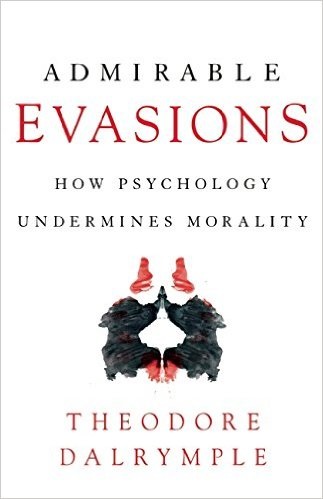 Admirable Evasions: How Psychology Undermines Morality by Theodore Dalrymple, Encounter Books, 2015. Available through Amazon, Barnes & Noble, and through Encounter Books. There is also a blog dedicated to Dalrymple’s work (although not authored by him) called The Skeptical Doctor. Well worth dipping into if you find the following review interesting.
Admirable Evasions: How Psychology Undermines Morality by Theodore Dalrymple, Encounter Books, 2015. Available through Amazon, Barnes & Noble, and through Encounter Books. There is also a blog dedicated to Dalrymple’s work (although not authored by him) called The Skeptical Doctor. Well worth dipping into if you find the following review interesting.
So how do the various schools of modern psychological thought, from Freudianism to behaviorism, to the self-esteem movement, to the evolution of the “selfish gene,” to the reductionism of seeing all human thought and emotion as simply the products of chance chemical reactions in the brain, “undermine morality”? By removing man’s personal responsibility for his own actions. Dalrymple repeats quotations from two Shakespeare plays throughout his book. One is from Hamlet, when the title character says, “You would pluck out the heart of my mystery” (Act III, Scene 2). But Hamlet is saying, and Dalrymple agrees, that no one can do that. No one can understand himself completely, let alone someone else. The other quotation is from King Lear, a speech by Edmund, who is pretty much the villain of the play but nevertheless displays a great deal of insight into the nature of man. This quotation is also the source of the title: “An admirable evasion of whoremaster man, to lay his goatish disposition to the charge of a star!” (Act I, Scene 2). (Although I have said that if I never see another Shakespeare play it will be too soon, I might just re-read Lear. I don’t remember much about Edmund, and he sounds fascinating.) In other words, Edmund is saying that man evades facing up to the darkness of his own heart by blaming some outward force. In Shakespeare’s time that force was astrology; thus the “star” in Edmund’s line. (Although I guess we haven’t quite gotten away from a belief in the stars, have we?) Today it’s whatever theory of human behavior currently holds the stage. Time and again Dalrymple points out the utter crudity of these ideas. As I have said myself, what a paltry view of man it is to see his every thought, word and deed as a result of random chance.
Now you might think that Dalrymple must be some kind of theoretician, some scholar sequestered in a library. But his career has instead been among the most troubling and problematic of populations: prisoners. He has worked as a prison doctor and psychiatrist (but one who rejects most psychiatric theory) both in sub-Saharan Africa and in London’s East End. He has heard every possible excuse for every possible crime. And he has seen the utter havoc brought about by the perspective that we can’t help what we do; that we have no choice. No, he thunders. We do a choice. That power of choice is what makes us human in the first place.
I could quote line after line from this book, but I’m going to restrain myself. I will simply say that if you think a book about modern psychological theories has to be dull and boring, you couldn’t be more wrong. I brought this book along to read aloud as our “trip book” for our recent driving extravaganza, and Jim and I enjoyed it immensely. Do take a look for yourself!
Great article and good points! Theodore Dalrymple is one of Mark’s favorite authors and he’s constantly printing our articles of his for me to read.
Dalrymple is both logical and loving–two things often considered opposites. Because he is both, he is passionate and determined to help people, not pat them on the head as they walk over the cliff.